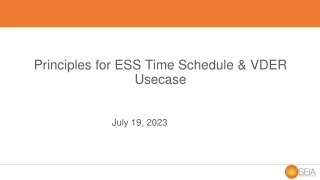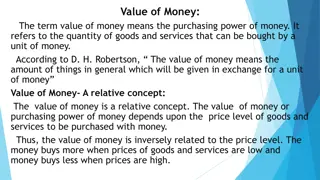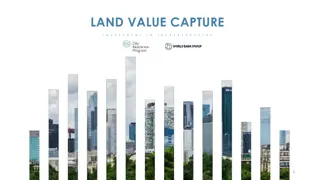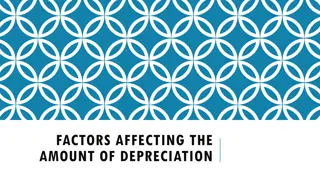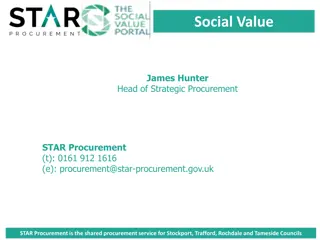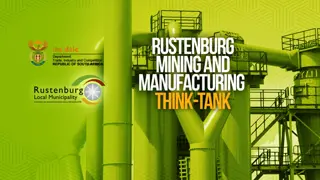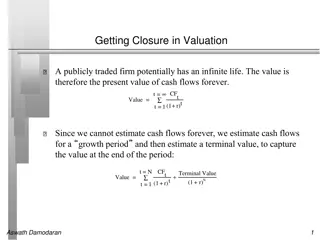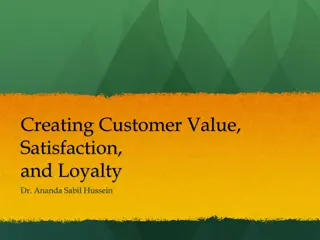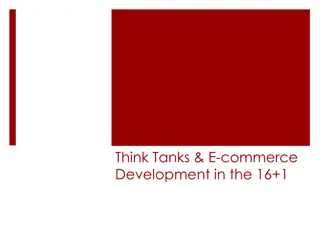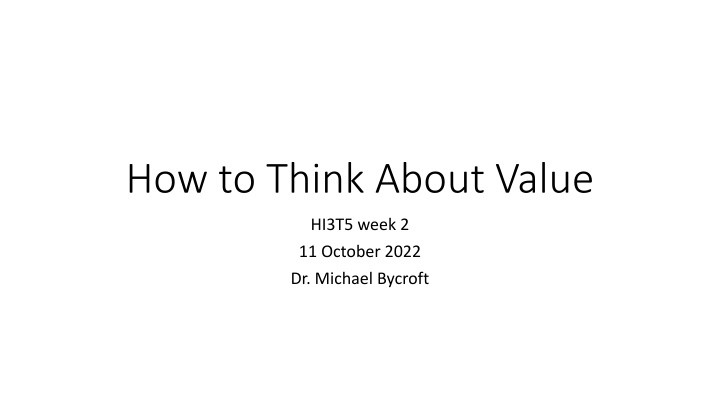
Exploring Value and Theories of Worth in Historical Context
Delve into the concepts of value and worth through the lens of various economic theories, historical events, and societal perspectives. Discover the significance of production, consumption, evaluation, and material assessment in shaping societies. Explore how different commodities such as gold, sugar, diamonds, and more have influenced global economies and cultural shifts. Engage with the works of renowned authors like John Locke and delve into modern discussions on the value of everything in the global economy.
Download Presentation

Please find below an Image/Link to download the presentation.
The content on the website is provided AS IS for your information and personal use only. It may not be sold, licensed, or shared on other websites without obtaining consent from the author. If you encounter any issues during the download, it is possible that the publisher has removed the file from their server.
You are allowed to download the files provided on this website for personal or commercial use, subject to the condition that they are used lawfully. All files are the property of their respective owners.
The content on the website is provided AS IS for your information and personal use only. It may not be sold, licensed, or shared on other websites without obtaining consent from the author.
E N D
Presentation Transcript
How to Think About Value HI3T5 week 2 11 October 2022 Dr. Michael Bycroft
This seems to me the source of all libertyFor during this suspension of any desire, before the will be determined to action, and the action done, we have opportunity to examine, view, and judge, of the good and evil of what we are going to do. John Locke, Essay Concerning Humane Understanding (1790), book II chap. 21
https://warwick.ac.uk/fac/arts/history/students/modules/hi3t5/https://warwick.ac.uk/fac/arts/history/students/modules/hi3t5/
Labour theory Neoclassical (aka subjectivist/marginal/eye-of- beholder/price/market) theory Bourdieu s distinction theory Graeber s action theory Mazzucato s ? theory
Production Consumption Circulation Evaluation
Medical testing (drugs) Connoisseurship (paintings) Quality control (textiles, alcohol) Assaying (metals) Surveying (land, oceans) Materials testing (wood, iron, stones) Metrology (quantifiable things) Consumption (various) .
Material evaluation Technique Science Material world Age of Reason
TERM 1 1.2 How to Think About Value 1.3 Gold and the Atlantic Slave Trade 1.4 Sugar and the Plantation System 1.5 Diamonds and Imperial Rivalry 1.7 Coffee and Orientalism 1.8 Textiles and the Enlightened Consumer 1.9 Horses and Englishness 1.10 Mineral Water and the Growth of Towns
TERM 2 2.1 Alcohol and the Fiscal State 2.2 Muskets and the End of the Old Regime 2.3 Air and Social Reform 2.4 Jewellery and the Industrial Revolution 2.5 Land and the British Empire 2.7 The Pacific Ocean and Global Encounters 2.8 Rocks and the Discovery of Deep Time 2.9 Heaven and the Discovery of Deep Space 2.10 Ecosystems and Romantic Science 3.1 Value in the Age of Smartphones
Mazzucato, Mariana. The Value of Everything: Making and Taking in the Global Economy. 2018. Helm, Dieter. Natural Capital: Valuing Our Planet. 2015. Anderson, Victor. Debating Nature's Value: the Concept of 'Natural Capital. 2018. Mart nez Alier, Juan. The Environmentalism of the Poor: A Study of Ecological Conflicts and Valuation. 2002. Vanderbilt, Tom. You May Also Like: Taste in an Age of Endless Choice. 2016. Clune, Michael W. A Defense of Judgement. 2021.
James Poskett, Newton's Slaves, in Horizons: A Global History of Science (London: Penguin, 2022). Simon Schaffer, Golden Means: Assay Instruments and the Geography of Precision in the Guinea Trade, in Instruments, Travel and Science, ed. Sibum et al, 20-50 Jasmine Kilburn-Toppin, A Place of Great Trust to be Supplied by men of Skill and Integrity : Assayers and Knowledge Cultures in Late Sixteenth- and Seventeenth- century London , British Journal of the History of Science 52, no 2 (2019): 197-223 -- Robert Boyle, A New Essay-Instrument Invented and Described by the Honourable Robert Boyle, Together with the Uses Thereof, Philosophical Transactions of the Royal Society of London 10, no. 115 (1675): 329-48
the ultimate freedom is not the freedom to create or accumulate value, but the freedom to decide (individually and collectively) what it is that makes life worth living. David Graeber, Toward an Anthropological Theory of Value (2001), p. 88


